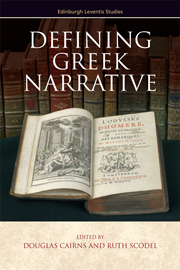Book contents
- Frontmatter
- Contents
- Preface
- Notes on Contributors
- 1 Introduction
- PART I DEFINING THE GREEK TRADITION
- PART II THE DEVELOPMENT OF THE GREEK TRADITION
- 6 Exemplarity and Narrative in the Greek Tradition
- 7 ‘Where do I begin?’: An Odyssean Narrative Strategy and its Afterlife
- 8 Some Ancient Views on Narrative, its Structure and Working
- 9 Who, Sappho?
- 10 The Creative Impact of the Occasion: Pindar's Songs for the Emmenids and Horace's Odes 1.12 and 4.2
- 11 Narrative on the Greek Tragic Stage
- 12 Stock Situations, Topoi and the Greekness of Greek Historiography
- 13 Heliodorus the Hellene
- PART III BEYOND GREECE
- Bibliography
- Index
12 - Stock Situations, Topoi and the Greekness of Greek Historiography
from PART II - THE DEVELOPMENT OF THE GREEK TRADITION
Published online by Cambridge University Press: 05 September 2014
- Frontmatter
- Contents
- Preface
- Notes on Contributors
- 1 Introduction
- PART I DEFINING THE GREEK TRADITION
- PART II THE DEVELOPMENT OF THE GREEK TRADITION
- 6 Exemplarity and Narrative in the Greek Tradition
- 7 ‘Where do I begin?’: An Odyssean Narrative Strategy and its Afterlife
- 8 Some Ancient Views on Narrative, its Structure and Working
- 9 Who, Sappho?
- 10 The Creative Impact of the Occasion: Pindar's Songs for the Emmenids and Horace's Odes 1.12 and 4.2
- 11 Narrative on the Greek Tragic Stage
- 12 Stock Situations, Topoi and the Greekness of Greek Historiography
- 13 Heliodorus the Hellene
- PART III BEYOND GREECE
- Bibliography
- Index
Summary
Scholars who work on Greek historiography tend to focus on the differences: Herodotus is the charming one who passes on local traditions; Thucydides is cynical about human nature and leaves religion out of history; Xenophon writes autobiographical history and peppers his work with intriguing dialogues; Polybius produced a handbook for statesmen, but is torn between Greece and Rome; Diodorus Siculus is only as good as his source; and so forth. But when we focus on these differences we often forget that, in fact, the works of Greek historiography, at least until the first century BC, are much more similar to each other than to any body of historiography that came after. In this chapter I shall try to define those characteristics of Greek historiography from the fifth to the first century BC that made it a distinct genre. Some of these characteristics can be hard to spot because they started a trend which either persisted into Roman historiography or has been reignited in modern historiography, but the sum of these various characteristics is nevertheless what makes Greek historiography Greek.
Before we begin, some remarks about my choice of material are in order. This study focuses on the Greek historiographers of the fifth to the first century bc whose works are extant in substantial form; that is Herodotus, Thucydides, Xenophon, Polybius and Diodorus Siculus. I stop at Diodorus because this volume concerns itself with what is distinctive about Greek narrative, and after Diodorus Greek historiography merges with Roman historiography to such a degree that it becomes impossible to keep the two traditions apart.
- Type
- Chapter
- Information
- Defining Greek Narrative , pp. 241 - 259Publisher: Edinburgh University PressPrint publication year: 2014



